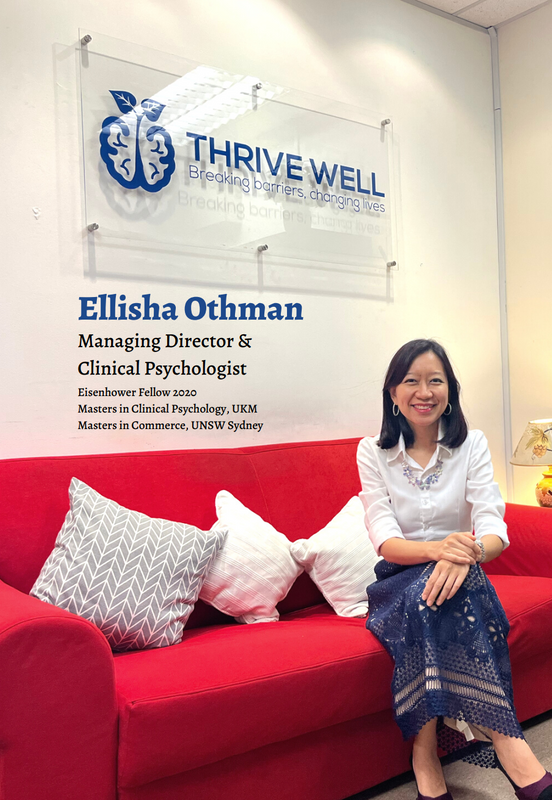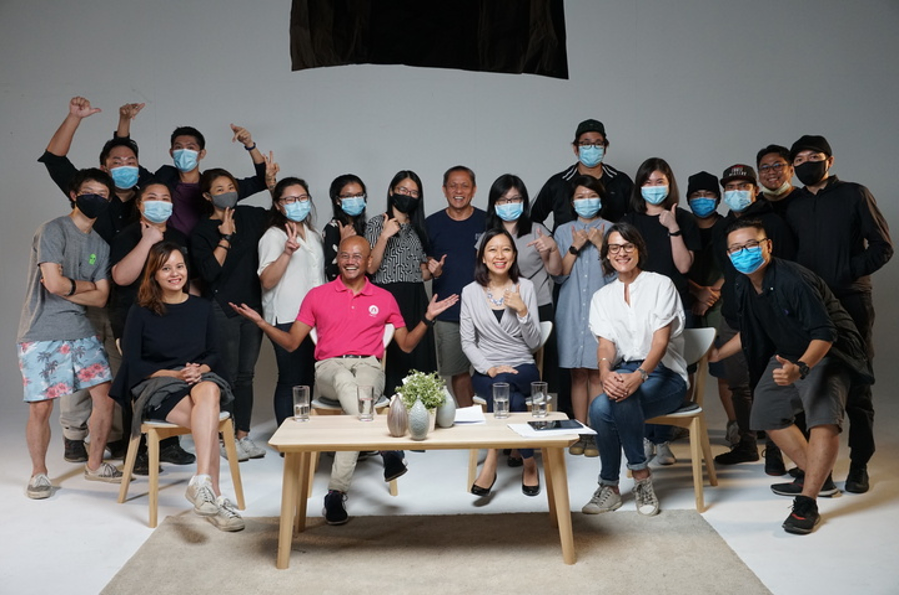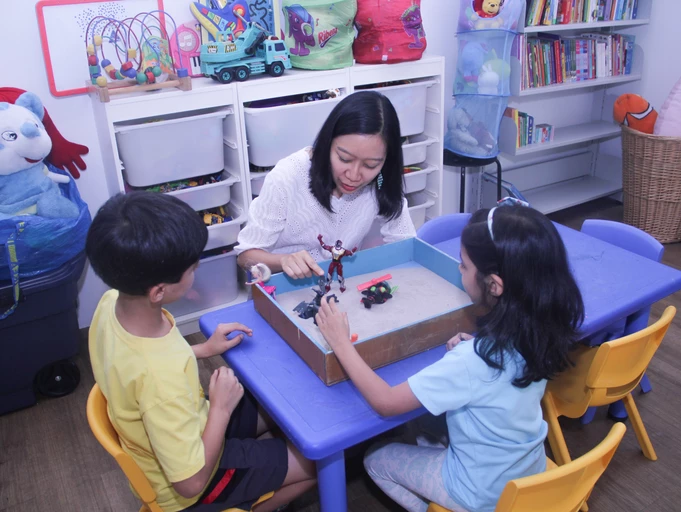This Social Enterprise Offers Therapy & Supports B40 Groups With Mental Health Services
Established during the first year of the pandemic, Thrive Well has over 50 social development and mental health practitioners to offer mental health services to individuals, corporations, and at-risk B40 groups.
Meet Ellisha Othman, a clinical psychologist who established Thrive Well during the first year of the pandemic with a goal of helping everyone improve their mental health
By everyone, Ellisha means everyone, especially the B40 community
Founded in October 2020, Thrive Well has over 50 team members comprising of a diverse group of mental health practitioners and social development professionals.
It has directly serviced over 1,500 individuals in the 23 months, which extends to impacting 6,000 individuals through its services and programmes.
The less-than-two-year-old social enterprise has over five initiatives, each targeting different clients with different needs:
1. Clinical Services
– Location: Wisma BU8
– For individuals who can afford regular-priced therapy
– Mental health screening and psychological assessments
– Services include group psychotherapy, family and couple therapy, and career assessment & counselling
2. Jom Sembang Programme
– Location: Anywhere, the team will come to the clients
– For the B40 community, at-risk groups or vulnerable family members, or individuals facing domestic violence
– Services are offered at subsidised rates between RM10 and RM50
– Funded by corporations, generous donors, and campaign drives
3. Thriving Professionals Programme
– Location: At clients' workplaces
– For employees and employers, paid by the latter
– It is an employee assistance programme designed to increase the performance of employees and subsequently build resilience within the organisation
– Services from this programme normally deal with non-severe cases
– Services include individual consultation, management consultation, workplace wellbeing assessment, organisation's mental health strategy, review & consultation, and webinars/workshops
4. BRAVE Programme
– Location: at clients' workplaces
– For employees and employers, paid by the latter
– The Building Resilience, Acceptance, Valiance, and Empowerment (BRAVE) programme is designed to provide frontline professionals from various industries with mental health services through the Trauma-Informed Care approach
– For example, some departments in a company are more stressful and more prone to trauma than others. This includes customer service employees who are at risk of facing verbal abuse from customers, as well as, teachers who have to handle the COVID-19 crisis and students' mental health conditions.
– The programme is designed to build their capacity to handle their work
5. K.A.M.I. (Community Development)
– Location: Focus on B40 groups in low-income housing (Projek Perumahan Rakyat - PPR) areas in Klang Valley
– This programme is for the community, where the stigma of receiving mental health services is high
– The Thrive Well team goes to the PPR areas instead of having the clients come to them, as some families do not have the accessibility or time to bring a family member for treatment
– To date, the team has discovered that the community has high levels of depression and anxiety, strained family relationships, low self-esteem, difficulty communicating and managing certain emotions, and more
– There are six initiatives under this programme, each designed for different age groups and family members
– Aims to tackle include mental health conditions that are triggered by socio-economical problems faced by B40 families, especially mothers. Examples include family conflict, inadequate access to social and healthcare services (caregiving and childcare), financial difficulties during the pandemic, and education challenges during the pandemic.
– As of August, the programme has served over 1,000 individuals
With an impressive track record and programmes to support different communities in Malaysia, SAYS spoke with Ellisha to understand the inner workings of the organisation
Ellisha started her career in the finance and accounting fields and worked for a government-linked company.
"I worked in the corporate world for five years and then I took some time off. I resigned and studied for three years to train as a clinical psychologist," she related.
She said she witnessed the daunting effects of the 1997 financial crisis, when millions of families experienced physical and mental health conditions.
"Personally, it definitely affected me. I was struggling academically and my father was facing cancer at that time. I then moved to Australia to study for my undergrad," she added, saying her journey made her realise the path she wanted to take.
Ellisha said that receiving counselling while studying in Australia helped her understand the importance of mental health treatment, admitting that even she initially struggled with the stigma of seeking help as well.
Thrive Well's "Go Slow to Go Fast Festival" campaign in conjunction with Suicide Awareness Day in 2021.
Image via Thrive WellEllisha graduated with a Master's Degree in clinical psychology and began working with SOLS 24/7, a non-governmental organisation (NGO) that supports the B40 community
The NGO serves, educates, and empowers the bottom 40% of the population with free education, personal development, and employment support.
She started in 2013, and by 2015, with funding and support from the NGO, they established SOLS Health, giving her the first experience of providing mental health services and programmes to underprivileged communities.
The adversity brought about by the pandemic created a surge in demand for mental health services, which created the opportunity for Ellisha to incorporate a new social enterprise, Thrive Well.
The social enterprise's main mission is to make an impact in the mental health industry by developing and delivering mental health services using the trauma-informed care approach.
Throughout the years, Ellisha has worked with many at-risk individuals. One client that struck her the most was a 16-year-old boy whose physique looked like a 12-year-old.
"We discovered he had a high Adverse Childhood Experience (ACE) score due to physical abuse, poverty, and a history of mental illness in the family. High ACE scores have been proven to stunt a child's overall development. This was the pivotal moment in our journey to focus on Trauma-Informed Care practices," chronicled in Thrive Well's 2021 report.
Ellisha described the way Kumar (alias) narrated his family's experience with hardcore poverty and substance abuse as "so nonchalant," as if "he didn't realise what he went through was not normal."
From the case of Kumar, she learned that giving therapy was not enough to help at-risk individuals.
"The crucial determinant of mental health is very important. We can give therapy, but we also need to make sure the person's environment — in terms of social health and education — gets support," she related.
She added that it is important to provide a healthy relationship with adults, especially with children who have experienced adverse childhood experiences (ACEs), to buffer them from the harmful consequences of these adversities.
Ellisha said if the adult could not be their parents, it could be their teacher.
"So, for this young man, education was [a challenge]. So, he enrolled in informal education at SOLS 24/7. They provided education and he was able to catch up on his learning. And with therapy, he was able to process his trauma," she shared.
Kumar's story has made therapy and Trauma-Informed Care practices come hand-in-hand in all of Ellisha and Thrive Well's work.
The dual approach focuses on understanding the impact on trauma in the clients' lives and providing a wrap-around mental health service by working closely with partner organisations to facilitate the opportunity for the beneficiaries to be resilient and make positive life-changing decisions.
Sharing with SAYS, Ellisha said the best way to support Thrive Well is to use its paid services, as funds collected from the social enterprise will be channelled to its free or subsidised community services
Ellisha encourages more corporations to take up its Thriving Professionals Programme and BRAVE Programme, contending that building societal resilience can be done by first "helping ourselves, (before) we help someone we know, and then we help someone we don't know".
"(Help) yourself and someone you know, before paying forward to someone else who needs the services. With this three-fold method, we can build a resilient system," she said.
With the impending recession that could affect everyone globally, Ellisha said it is high time that everyone learns how to build resilience.
She shared some pearls of wisdom, noting, "The recession is coming, it will affect everyone globally at varying degrees. I think what's important is to build resiliency skills, which is the ability to bounce back and adapt to a new situation.
"We cannot stop the recession, but how do we learn those resiliency skills? This is where mental health comes in.
"Organisations may sometimes feel it is hard to justify (our programmes) as an investment, but I think it is important that we invest in our people's wellness."
To understand more about Thrive Well's services or to receive help, visit its website here.
All this month, SAYS will be featuring inspiring stories of extraordinary Malaysian changemakers in collaboration with Wiki Impact
Wiki Impact is an online platform dedicated to the impact industry. They share stories and data on issues that matter, highlighting impact-driven organisations and changemakers on the ground. Categories include poverty alleviation, social justice, gender equality, healthcare and education for all, environmental sustainability, animal welfare, impact influencers, and more!
Find out more here.





